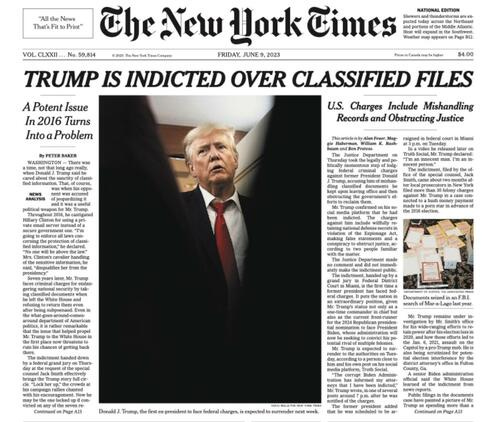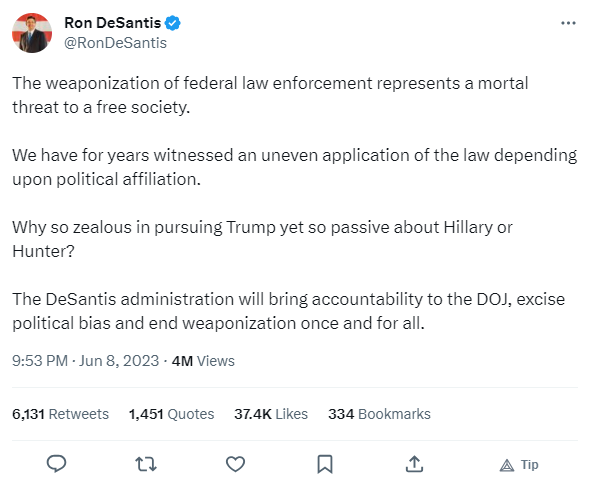The Great Projection
A key to understanding American politics today is the Freudian concept of projection: the establishment is itself guilty of what it falsely accuses Donald Trump of. Independent liberal journalist Michael Tracey put it pithily in the context of Thursday's news that Biden's Department of Justice had indicted Trump:
Projection applies as well to the establishment media's fears of Trump as threat to "our democracy". Despite their attempts to portray the January 6th fiasco at the Capitol as an "insurrection", that term could be more accurately applied to the BLM and antifa riots fomented by the media throughout the summer of 2020, including the riot at the White House that forced the Secret Service to move Trump to a bunker for his safety.
They are what they falsely accuse Trump of being, and in prosecuting Trump on specious grounds, the Biden Administration has stooped to a Ukrainian level of politics.
Trump Is No Revolutionary
If Trump were the threat to our system that the establishment claims he is, they wouldn't have declared lawfare on him as they have, because they would have feared an extra-legal response. Trump has tens of millions of supporters, and if only a fraction of them were mobilized they could cause real trouble. Imagine if Trump called for his trucker supporters to go on strike in protest? How long would supermarket shelves stay stocked? They prosecute Trump so zealously because they know he's going to fight back within the system (in court), not outside of it.
The Toothless Republican Response
This response by Governor Ron DeSantis,
Shares something in common with this better response by his fellow Presidential candidate Vivek Ramaswamy:
We can’t have two tiers of justice: one for Trump, another for Biden. One for Assange, another for Manning. One for BLM/Antifa, another for peaceful protesters on Jan 6.
I never thought we’d see the day when the U.S. President deputizes the DOJ to arrest his lead rival in the middle of an election. Obama shamefully tried to deputize the FBI to infiltrate Trump’s 2016 campaign, but they’re leaving nothing to chance this time around: the federal police state is outright arresting Trump.
This is an affront to every citizen: we cannot devolve into a banana republic where the party in power uses police force to arrest its political opponents. It’s hypocritical for the DOJ to selectively prosecute Trump but not Biden.
There are also serious legal questions about the President’s power to declassify documents and the potential illegality of the over-classification of federal documents in the first place. That’s for the courts to decide, but *we the people* decide who governs this nation.
It would be much easier for me to win this election if Trump weren’t in the race, but I stand for principles over politics. I commit to pardon Trump promptly on January 20, 2025 and to restore the rule of law in our country.
Ramaswamy does an excellent job of articulating the outrageousness of the Biden DOJ arresting the opposition's front runner during an election campaign, but like DeSantis, he fails to grok that the Biden administration has crossed the Rubicon. Responding to this by saying what you'll do when you're President misses the obvious point: If they get away with sidelining the guy leading you in the polls by double digits, they’ll do the same to you.
Republicans need a response now; not in some fantasy future where the establishment fights dirty against Trump but decides to use Marquess of Queensberry Rules against DeSantis.
Remember The Brooks Brothers Riot
There was a time when Republicans didn't roll over so easily, and as a Floridian, DeSantis ought to remember it: the "Brooks Brothers Riot" of 2000 in Miami. Unfortunately, it led to the election of George W. Bush, but nevertheless, Republicans today would do well to learn from it.
For those unfamiliar with the Brooks Brothers Riot, here's a description by a participant, Douglas Heye:
I was part of a large group of Republican congressional staffers recruited to go to Florida to observe the recount. For several days, our team spent hours upon hours a day, broken into morning and afternoon shifts, on the 18th floor of Miami’s Stephen F. Clark Government Center, watching as hole-punch ballots were counted by hand, noting which ones were “over-votes” — where more than one presidential candidate may have been chosen — or “under-votes” — where no candidate was clearly chosen — or ballots where there were indentations, but not a clear hole punched, leading observers and election officials to argue over voters’ intent and the meaning of now-famous “hanging chads.” Occasionally, a vote, or potential vote, would be challenged. Those would be moved to a separate pile to be examined, with close inspection using, in some instances, a magnifying glass. It was tedious, but we were motivated by the prospect of electing a Republican president after eight years of a Democratic administration.
On the morning of Nov. 22, 2000, however, counting had moved to the 19th floor. But instead of the recount of several hundred thousand ballots, the county canvassing board decided only to look at a much smaller subsection of votes; votes, my team was told, which came from precincts likely to benefit the Democratic candidate, Vice President Al Gore. Worse, we were told, this count would happen behind closed doors. No election observers or media allowed.
I didn’t fully know what to expect as I took the elevator up. By the time the elevator stopped at the 18th floor, it was clear something big was happening one floor up. As the doors opened on the 19th floor, there was loud chanting by energized, largely-GOP staffers, many of whom, it’s true, were outfitted in the Brooks Brothers attire popular at the time. They were fired up, and rowdy, but not violent.
“Let us in!” chanted the crowd that had been shut out. But that soon became “Let them in! Let them in!” — with “them” being the media present who were also shut out from covering the ongoing recount. I recall one colleague pulling down a poster with a phone number for a voter fraud hotline, waving it and shouting, “Call now! Call now!” Eventually, the canvassing board threw in the towel — there would be no partial recount, nor any count hidden from the public.
There was a bit more to the story than that; perhaps the key part missing there is that the Brooks Brothers Riot was organized by GOP insiders, such as Roger Stone. Today, it seems that many GOP insiders would be happy to see Trump sidelined, foolishly believing that their charisma-challenged candidate DeSantis wouldn't be prosecuted on spurious grounds if Biden thought DeSantis had a chance of winning.
They would do well instead to remember the wise council of Benjamin Franklin:
We must, indeed, all hang together or, most assuredly, we shall all hang separately.
Let's wrap this up on a positive note with a brief investing comment about bubbles.
Benefiting From A Bubble
A common misconception is that you should avoid bubbles when investing--what you really want to avoid is the end of the bubble. Bubbles can last a long time; the key is to hedge or otherwise manage your risk so you keep most of your gains.
The big bubble today is artificial intelligence, or AI. Each day the market is open Portfolio Armor's algorithm selects its top ten names, based on its estimates of their return potential over the next six months. At the end of last year, it selected two names positioned to benefit from the AI bubble, Super Micro Computer (SMCI 4.26%↑) and Rambus (RMBS 0.94%↑).
As you can see below, SMCI and RMBS have been the two top performers from our December 30th top names cohort.
You can find our current top names on the Portfolio Armor website and this Substack.










